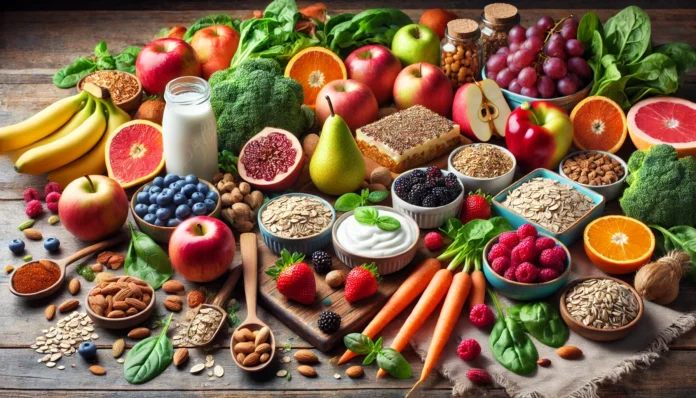Understanding the Importance of Gut Health
A well-functioning digestive system is essential for overall health and well-being. The human gut is not merely responsible for processing food; it also plays a pivotal role in nutrient absorption, immune function, and even mental health. When digestion is impaired, issues such as bloating, constipation, and irregular bowel movements can arise, leading to discomfort and potential long-term complications. Maintaining a healthy bowel requires a balanced diet rich in fiber, probiotics, and essential nutrients. The best food for bowel movement includes a variety of whole foods that promote gut motility and regularity, helping to ensure optimal digestive function.
You may also like: How to Improve Gut Health Naturally: Science-Backed Tips for a Stronger Microbiome
Gut health is intrinsically linked to the balance of microbiota in the intestines. The gut microbiome consists of trillions of bacteria, both beneficial and harmful, that work together to break down food, produce essential vitamins, and maintain the integrity of the gut lining. When this delicate balance is disrupted—often due to poor dietary choices, stress, or antibiotics—digestive health suffers. Incorporating good bowel foods into daily meals can help restore and maintain this equilibrium, preventing common gastrointestinal issues.
Fiber: The Cornerstone of Digestive Health
Dietary fiber is one of the most crucial components of a gut-friendly diet. Fiber is categorized into two types: soluble and insoluble, each playing a unique role in digestion. Soluble fiber dissolves in water, forming a gel-like substance that slows digestion and stabilizes blood sugar levels. Foods rich in soluble fiber include oats, beans, lentils, and apples. Insoluble fiber, on the other hand, adds bulk to stool and promotes movement through the digestive tract, reducing the risk of constipation. Whole grains, nuts, seeds, and many vegetables are excellent sources of insoluble fiber.
Regular consumption of high-fiber foods has been linked to a reduced risk of colorectal cancer, improved cholesterol levels, and enhanced overall bowel function. The recommended daily fiber intake is about 25 grams for women and 38 grams for men. However, many people fall short of this goal, leading to digestive sluggishness and irregularity. Gradually increasing fiber intake while staying hydrated can help the body adjust and maximize the benefits of fiber-rich foods.
The Role of Hydration in Bowel Regularity
Water is a fundamental component of healthy digestion. Proper hydration is essential for softening stool and facilitating its passage through the intestines. Without adequate fluid intake, stool can become hard and difficult to pass, leading to constipation and discomfort. Drinking at least eight glasses of water daily—or more depending on individual needs—can significantly improve bowel movement frequency and consistency.
Beyond water, hydrating foods such as cucumbers, watermelon, oranges, and broth-based soups contribute to overall fluid intake. Herbal teas, particularly those containing peppermint or ginger, can also aid digestion and soothe gastrointestinal distress. Proper hydration, combined with a fiber-rich diet, creates an optimal environment for regular and effortless bowel movements.
Probiotics and Prebiotics: Supporting a Healthy Gut Microbiome
Probiotics are beneficial bacteria that promote gut health by balancing the microbiome. Found in fermented foods such as yogurt, kefir, sauerkraut, kimchi, and miso, probiotics help break down food, enhance nutrient absorption, and strengthen the intestinal barrier. Regular consumption of probiotic-rich foods can improve digestion and alleviate symptoms of irritable bowel syndrome (IBS) and bloating.
Prebiotics, on the other hand, serve as food for probiotics. These non-digestible fibers found in foods such as garlic, onions, bananas, asparagus, and leeks encourage the growth of beneficial bacteria in the gut. A diet that includes both probiotics and prebiotics fosters a thriving microbiome, reducing the risk of digestive discomfort and promoting overall gut health.

Best Food for Bowel Movement: Top Choices for Regularity
Several foods stand out as particularly effective for supporting bowel movements and preventing constipation. Among the best food for bowel movement are:
- Prunes and Figs – These fruits are natural laxatives due to their high fiber and sorbitol content, which draws water into the intestines and softens stool.
- Flaxseeds and Chia Seeds – Packed with omega-3 fatty acids and soluble fiber, these seeds help lubricate the intestines and promote smooth digestion.
- Leafy Greens – Spinach, kale, and Swiss chard provide magnesium, a mineral that relaxes the muscles of the digestive tract and encourages bowel movements.
- Oats – A great source of soluble fiber, oats support gut motility and provide long-lasting energy.
- Legumes – Lentils, chickpeas, and black beans are excellent sources of fiber and protein, aiding digestion and promoting gut health.
- Papaya and Pineapple – These tropical fruits contain natural digestive enzymes, papain and bromelain, which help break down food and support digestion.
- Yogurt and Kefir – Rich in probiotics, these dairy products improve gut flora balance and enhance stool consistency.
The Connection Between Gut Health and Mental Well-Being
Emerging research suggests a strong link between gut health and mental well-being. The gut-brain axis, a bidirectional communication system between the digestive tract and the central nervous system, plays a critical role in mood regulation and cognitive function. A diet rich in good bowel foods can positively influence mental health by reducing inflammation, modulating stress responses, and enhancing serotonin production.
Foods high in fiber, probiotics, and essential nutrients contribute to a more balanced gut microbiome, which in turn supports mental clarity and emotional stability. For individuals experiencing anxiety, depression, or cognitive sluggishness, improving digestive health through proper nutrition may yield significant benefits. Additionally, reducing processed foods, excessive sugars, and artificial additives can help mitigate gut-related mental health disturbances.
Lifestyle Factors That Influence Bowel Regularity
While diet plays a central role in digestive health, other lifestyle factors also contribute to regular bowel movements. Physical activity stimulates intestinal contractions, helping move waste efficiently through the digestive system. Regular exercise, whether through walking, yoga, or strength training, can prevent constipation and support gut motility.
Stress management is equally important, as chronic stress negatively impacts gut function. High-stress levels can alter gut bacteria composition and slow digestion. Practices such as meditation, deep breathing, and adequate sleep contribute to overall digestive wellness. Establishing a consistent eating schedule and avoiding late-night meals can also improve digestion and prevent gastrointestinal discomfort.

Frequently Asked Questions (FAQ) on Gut Health and Digestion
1. How does diet impact bowel movement frequency and consistency?
Diet plays a crucial role in regulating bowel movements, as the foods consumed directly affect stool texture, gut motility, and microbial balance. A diet rich in fiber, such as fruits, vegetables, legumes, and whole grains, adds bulk to the stool and promotes regularity. Additionally, consuming adequate fluids ensures that fiber functions effectively, preventing dry and hard stool that can lead to constipation. Probiotic-rich foods like yogurt, kefir, and kimchi help maintain a balanced gut microbiome, which is essential for smooth digestion. Incorporating good bowel foods consistently into daily meals supports optimal digestive health and reduces discomfort related to irregular bowel habits.
2. What are some lesser-known foods that can naturally promote bowel regularity?
While fiber-rich fruits and vegetables are widely recognized as good bowel foods, several lesser-known options can also enhance digestion. Jerusalem artichokes, for instance, are packed with inulin, a prebiotic fiber that nourishes beneficial gut bacteria and improves stool consistency. Kiwifruit contains an enzyme called actinidin, which aids in breaking down proteins and easing bowel movements. Psyllium husk, a powerful soluble fiber supplement, absorbs water and forms a gel-like substance that supports smooth elimination. Seaweed, particularly varieties like nori and wakame, contains polysaccharides that can support gut health and function. By incorporating a variety of the best food for bowel movement into a diet, individuals can experience improved digestive efficiency and relief from constipation.
3. How do stress and mental health influence bowel movements?
Stress and mental health significantly affect gut function through the gut-brain axis, a communication system linking the nervous and digestive systems. When under stress, the body produces hormones such as cortisol, which can slow digestion and cause constipation or, conversely, trigger diarrhea. Anxiety can lead to hypersensitivity in the gut, resulting in bloating, cramps, and irregular bowel movements. Practicing stress-reducing activities such as meditation, deep breathing, and regular exercise can help regulate digestive function. Additionally, consuming good bowel foods that promote gut bacteria diversity, such as fermented foods and fiber-rich meals, can support both mental clarity and digestive balance.
4. Can hydration alone improve bowel movement regularity?
Hydration is a key factor in maintaining regular bowel movements, but it works best in conjunction with a fiber-rich diet. Water helps soften stool, making it easier to pass, and prevents dehydration-related constipation. Warm beverages, such as herbal teas and lemon-infused water, can stimulate digestion and encourage bowel movements. Coconut water, which is high in electrolytes, supports hydration and intestinal function. While drinking sufficient water is essential, pairing it with good bowel foods, such as hydrating fruits and fiber-rich vegetables, ensures the best results in achieving consistent digestive health.
5. What are some potential side effects of consuming too much fiber?
While fiber is crucial for digestion, excessive intake can lead to discomfort if not balanced with proper hydration. Overconsumption of fiber can cause bloating, gas, and even temporary constipation due to the increased bulk in the digestive tract. Some individuals may also experience abdominal cramping if they suddenly increase their fiber intake without giving their gut time to adjust. To prevent these issues, it is recommended to gradually incorporate the best food for bowel movement into a diet while ensuring an adequate fluid intake. Fermented foods and digestive enzymes can also help ease the transition and minimize potential side effects.
6. How does sleep quality impact digestion and bowel health?
Sleep quality plays a fundamental role in regulating digestive processes, as the body’s circadian rhythm influences gut motility and microbial balance. Poor sleep disrupts hormonal regulation, leading to slower digestion and an increased risk of constipation. Studies show that individuals with irregular sleep patterns are more likely to experience gastrointestinal discomfort, bloating, and altered bowel movements. Consuming foods that promote both gut health and relaxation, such as bananas (which contain magnesium) and herbal teas, can aid digestion and enhance sleep quality. Establishing a consistent bedtime routine, along with a diet rich in good bowel foods, can contribute to a healthier gut and improved digestive regularity.
7. Are there specific foods that can help with both digestion and reducing bloating?
Yes, certain foods have dual benefits of aiding digestion while reducing bloating. Ginger is well known for its ability to stimulate gastric emptying and relieve bloating by promoting efficient digestion. Fennel seeds contain compounds that relax intestinal muscles, reducing gas buildup and abdominal discomfort. Peppermint has antispasmodic properties that help ease bloating by calming the digestive tract. Pineapple contains bromelain, an enzyme that aids in breaking down proteins, reducing bloating caused by sluggish digestion. Incorporating these into meals, alongside the best food for bowel movement, can enhance digestive comfort and minimize bloating episodes.
8. How does aging affect digestive health and bowel regularity?
As individuals age, digestive function naturally slows, leading to changes in bowel habits and an increased risk of constipation. This is often due to decreased muscle tone in the intestines, reduced physical activity, and lower fluid intake. The gut microbiome also shifts with age, sometimes resulting in a decline of beneficial bacteria that support digestion. Increasing fiber intake through foods like prunes, oats, and leafy greens can help counteract these changes. Staying hydrated, maintaining an active lifestyle, and consuming probiotic-rich good bowel foods can help older adults maintain regular bowel movements and overall digestive well-being.
9. Can intermittent fasting improve digestion and bowel health?
Intermittent fasting has been shown to support digestive efficiency by allowing the gut to rest and reset between eating periods. During fasting windows, the digestive system experiences a cleansing process known as the migrating motor complex (MMC), which helps sweep away undigested food particles and bacteria. This process can improve bowel movement regularity by reducing bloating and promoting gut motility. However, it is essential to break a fast with the best food for bowel movement, such as fiber-rich fruits and fermented foods, to maintain digestive balance. Those new to fasting should start gradually and monitor how their gut responds before making significant dietary adjustments.
10. What role do spices and herbs play in supporting bowel health?
Spices and herbs can have powerful effects on digestion and gut motility, making them valuable additions to a gut-friendly diet. Turmeric contains curcumin, which has anti-inflammatory properties that support gut lining integrity and reduce bloating. Cinnamon can help regulate blood sugar levels while promoting digestive enzyme production. Cumin is known to stimulate bile production, aiding fat digestion and preventing sluggish bowel movements. Incorporating these natural ingredients alongside good bowel foods enhances digestive function and supports overall gut health. Adding small amounts of these spices to daily meals can provide long-term benefits for digestive wellness.
By considering these frequently asked questions, individuals can gain deeper insights into the connection between diet, lifestyle, and bowel health. Implementing a well-rounded approach that includes hydration, fiber-rich foods, probiotics, and mindful eating habits will help foster a strong and resilient digestive system.

Conclusion: Nourishing Your Gut for Long-Term Health
Achieving optimal digestive health requires a holistic approach that incorporates fiber-rich foods, adequate hydration, probiotics, and a balanced lifestyle. The best food for bowel movement includes a variety of fruits, vegetables, whole grains, and fermented foods that support gut motility and microbiome balance. Good bowel foods not only improve digestion but also enhance nutrient absorption, immune function, and mental well-being.
By prioritizing gut-friendly foods and making mindful lifestyle choices, individuals can foster a healthier digestive system, reduce discomfort, and enjoy long-term wellness. Whether dealing with occasional irregularity or seeking to optimize gut health, incorporating these dietary principles can lead to significant and lasting benefits.
healthy digestion tips, foods for gut health, improve bowel regularity, natural digestion remedies, fiber-rich diet, best foods for gut flora, digestive system support, probiotic-rich foods, high-fiber meal ideas, hydration for digestion, natural laxative foods, gut microbiome balance, prebiotic foods for digestion, anti-bloating foods, colon health diet, digestive wellness foods, best natural sources of fiber, nutrition for constipation relief, whole foods for gut health, maintaining digestive balance
Further Reading:
What are the best foods to aid digestion?
5 Foods to Improve Your Digestion
Eating, Diet, & Nutrition for Constipation
Disclaimer
The information contained in this article is provided for general informational purposes only and is not intended to serve as medical, legal, or professional advice. While Health11News strives to present accurate, up-to-date, and reliable content, no warranty or guarantee, expressed or implied, is made regarding the completeness, accuracy, or adequacy of the information provided. Readers are strongly advised to seek the guidance of a qualified healthcare provider or other relevant professionals before acting on any information contained in this article. Health11News, its authors, editors, and contributors expressly disclaim any liability for any damages, losses, or consequences arising directly or indirectly from the use, interpretation, or reliance on any information presented herein. The views and opinions expressed in this article are those of the author(s) and do not necessarily reflect the official policies or positions of Health11News.


